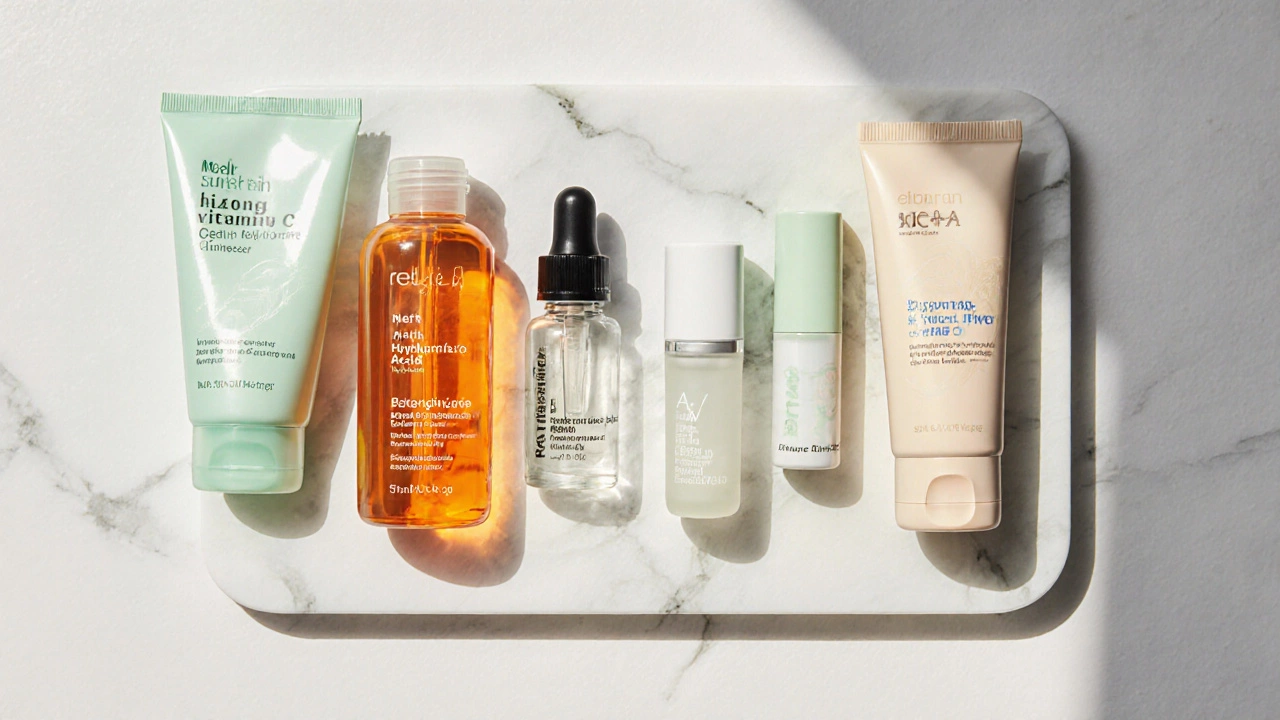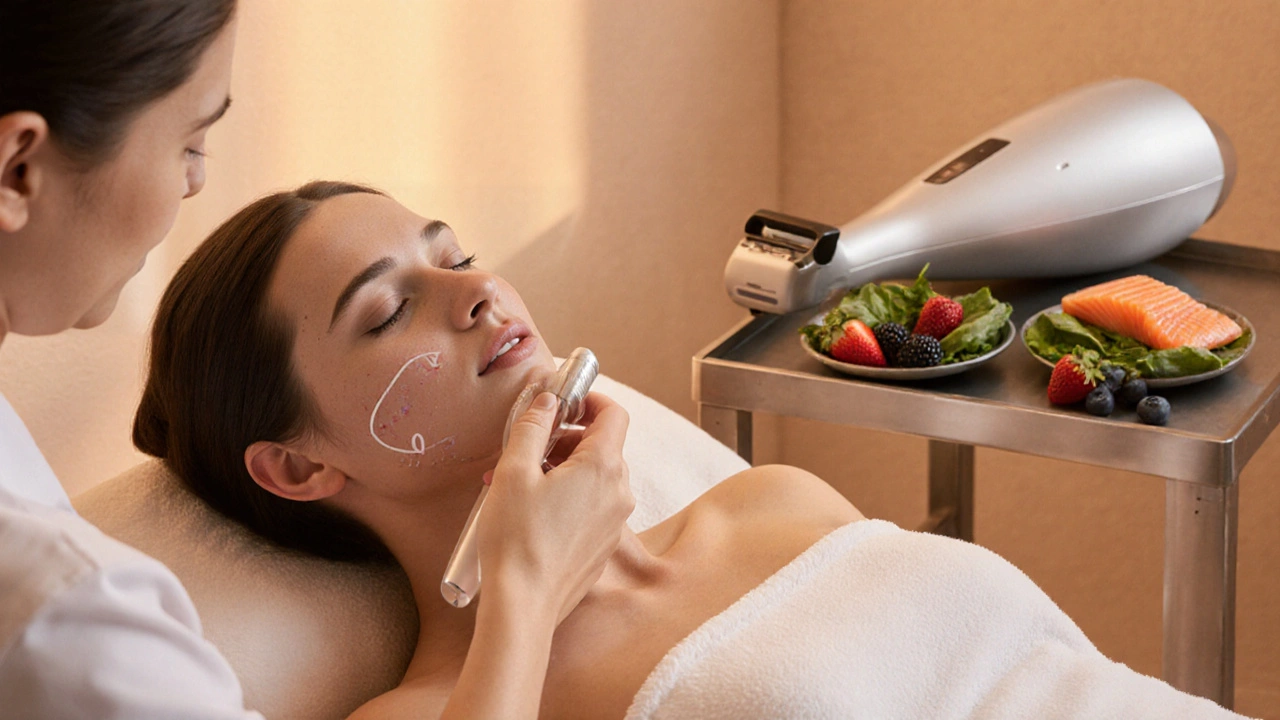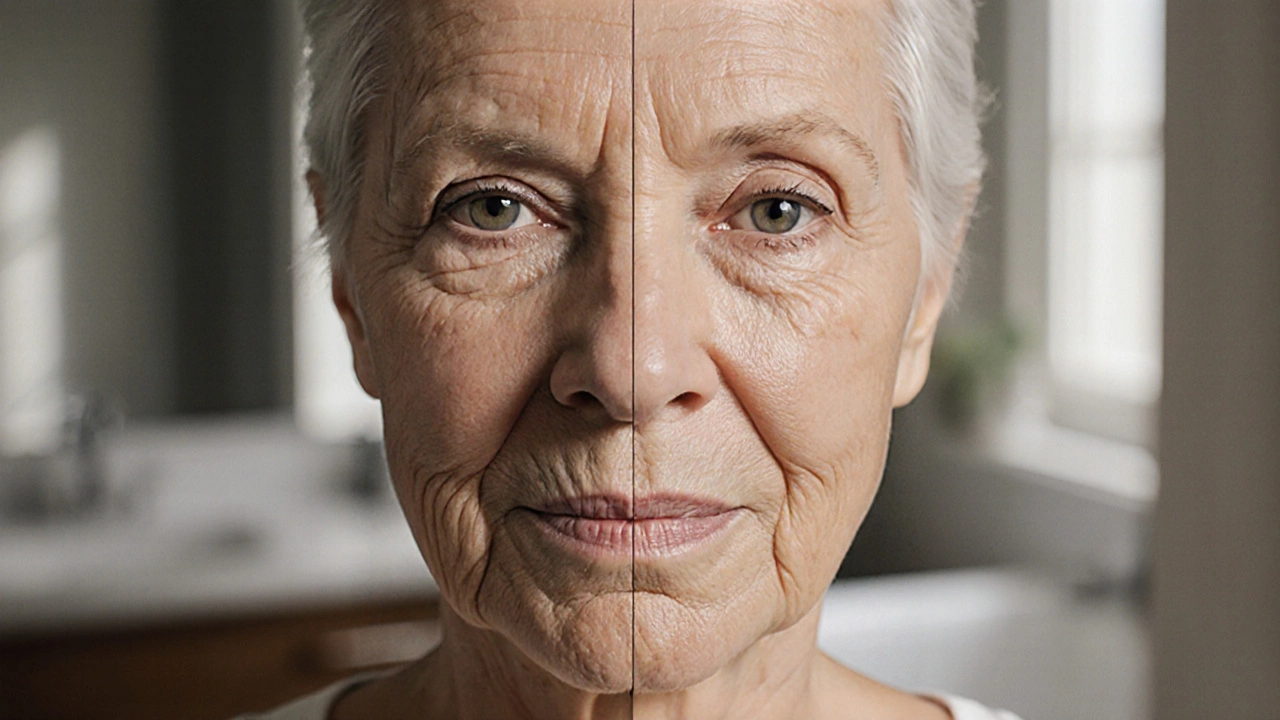Anti-Aging Skincare Routine Builder
Build Your Custom Routine
Select ingredients you already have. The tool will generate a personalized routine with application order, concentration guidance, and warnings for incompatible combinations.
Your Products
Personalized Routine
Important Safety Notes
- Never mix retinol and AHA in the same application time - causes severe irritation
- Use sunscreen daily - even when not applying retinol
- Start slowly with retinol (0.25% for 2 weeks before increasing)
- Exfoliate no more than 2-3 times weekly with AHAs
When your skin starts to show fine lines, loss of firmness, or uneven tone, you’re probably wondering how to turn back the clock. Anti-Aging Skincare is a collection of products, habits, and professional treatments designed to restore collagen, boost hydration, and protect against future damage offers a practical roadmap for anyone who wants a smoother, healthier‑looking face.
Key Takeaways
- Focus on sun protection, hydration, and collagen‑stimulating ingredients.
- Build a simple, layered routine: cleanse → antioxidant serum → retinoid → moisturizer → sunscreen.
- Support skin from the inside with diet, sleep, and stress management.
- Consider professional options like microneedling or laser resurfacing for deeper repair.
- Avoid common pitfalls such as over‑exfoliating and mixing conflicting actives.
Understanding Facial Aging
Skin ages for three main reasons: intrinsic (genetics and natural cell turnover), extrinsic (UV exposure, pollution), and lifestyle (sleep, diet). With age, fibroblasts slow down, producing less collagen and elastin. The barrier lipids that keep moisture in also decline, leading to dryness and a rough texture. Recognising these changes helps you pick the right tools for repair.
Core Principles of Face Repair
Three pillars keep an aging face looking youthful:
- Protection: Block UV and blue light every day.
- Hydration: Replenish the skin’s natural moisture‑binding molecules.
- Stimulation: Encourage new collagen and elastin production.
Every product you add should support at least one of these pillars.

Essential Ingredients and Their Roles
Below are the power players that actually move the needle.
- Retinol a vitamin A derivative that accelerates cell turnover and boosts collagen synthesis - best applied at night to avoid sun sensitivity.
- Vitamin C Serum an antioxidant that brightens, evens tone, and protects against free‑radical damage - use in the morning before sunscreen.
- Hyaluronic Acid a humectant that draws up to 1000× its weight in water, plumping fine lines - layer under moisturizers for an instant boost.
- Peptide Complex short chains of amino acids that signal skin to produce more collagen - works well with moisturizers.
- Alpha‑Hydroxy Acid (AHA) a chemical exfoliant that dissolves dead‑skin bonds, revealing smoother texture - limit to 2‑3 times weekly.
- Sunscreen broad‑spectrum SPF 30+ that blocks UVA and UVB rays, the biggest cause of premature aging - must be the final step every morning.
- Microneedling a minimally invasive procedure that creates micro‑channels, prompting collagen renewal - consider 3‑month intervals for home‑use rollers.
- Laser Resurfacing a professional laser treatment that removes damaged layers and stimulates deep collagen production - suited for deeper wrinkles and texture issues.
Building an Anti-Aging Skincare Routine
- Cleanse: Use a gentle, sulfate‑free cleanser to avoid stripping oils.
- Antioxidant Serum: Apply a vitamin C serum on damp skin to enhance absorption.
- Retinoid: At night, use a pea‑size amount of retinol. If you’re new, start with 0.25% and build up.
- Moisturizer: Choose a product containing hyaluronic acid and peptides for added repair.
- Sunscreen: Finish with a broad‑spectrum SPF 30+ moisturizer or dedicated sunscreen. Reapply every 2hours outdoors.
For oily or combination skin, consider a lightweight gel‑based moisturizer; for dry skin, a richer cream with ceramides works best.
Lifestyle Habits That Accelerate Repair
- Sleep: Aim for 7‑9hours; growth hormone released during deep sleep aids tissue repair.
- Nutrition: Eat antioxidant‑rich foods (berries, leafy greens) and omega‑3 fatty acids (salmon, walnuts) to support skin cell membranes.
- Hydration: Drink at least 2L of water daily; dehydrated skin looks duller.
- Stress Management: Chronic cortisol breaks down collagen; practice meditation or short walks.
Professional Treatments to Consider
If you want faster results, these in‑clinic options complement your daily routine:
- Microneedling: Creates controlled micro‑injuries, boosting collagen. Home rollers are okay for beginners, but a dermatologist can offer deeper penetration.
- Laser Resurfacing: Fractional CO₂ or erbium lasers target deeper wrinkles. Recovery can take 5‑7days, but results are dramatic.
- Chemical Peels: Light AHA peels improve texture, while medium‑strength glycolic or TCA peels address pigmentation.
- Radiofrequency (RF) Therapy: Uses heat to tighten collagen without downtime.
Always discuss your skin type and any sensitivities with a certified professional before booking.

Common Mistakes to Avoid
- Skipping sunscreen because it feels greasy - opt for a matte finish formula if shine bothers you.
- Layering multiple strong actives (retinol + AHA) in one night - this can cause irritation and barrier damage.
- Using products past their expiration date - antioxidants lose potency after 12months.
- Expecting overnight miracles - visible improvement usually appears after 8‑12weeks of consistent use.
Quick Comparison of Top Anti‑Aging Ingredients
| Ingredient | Main Benefit | When to Apply | Common Concentration |
|---|---|---|---|
| Retinol | Boosts collagen, smooths fine lines | Night | 0.25%‑1% |
| Vitamin C | Brightens, protects from free radicals | Morning | 10%‑20% |
| Hyaluronic Acid | Intense hydration, plumps skin | Both morning & night | 0.5%‑2% |
| Peptide Complex | Stimulates collagen production | Morning or night | 2%‑5% |
| AHA (Glycolic) | Exfoliates, improves texture | Evening (2‑3×/week) | 5%‑10% |
Final Checklist: Daily & Weekly Actions
- Morning: Cleanse → Vitamin C → Moisturizer with peptides → SPF 30+.
- Evening: Cleanse → Retinol (or AHA on alternate nights) → Hyaluronic acid → Rich moisturizer.
- Weekly: 1‑2 gentle chemical exfoliations, 1‑2 mask treatments for extra hydration.
- Monthly: Professional microneedling or laser session (if budget allows).
- Lifestyle: 8hrs sleep, antioxidant‑rich diet, stress‑relief practice.
Frequently Asked Questions
Can I use retinol and vitamin C together?
It’s safer to separate them: vitamin C in the morning and retinol at night. Mixing them can increase irritation for most skin types.
How often should I apply sunscreen?
Reapply every two hours outdoors, and after swimming or sweating. Even on cloudy days, UV rays penetrate, so daily use is a must.
Is a facial oil good for aging skin?
Yes, especially oils rich in linoleic acid (like rosehip or squalane). They lock in moisture without clogging pores, which helps maintain barrier function.
What’s the difference between a peel and microneedling?
Peels use chemicals to remove the outer skin layer, while microneedling creates micro‑injuries to trigger deeper collagen production. Both improve texture, but microneedling often yields longer‑term firmness.
Can diet really affect wrinkles?
Absolutely. Foods high in sugar cause glycation, which stiffens collagen. Antioxidant‑rich fruits, nuts, and omega‑3s protect fibers and keep skin supple.

